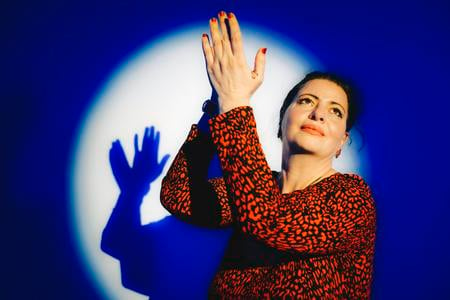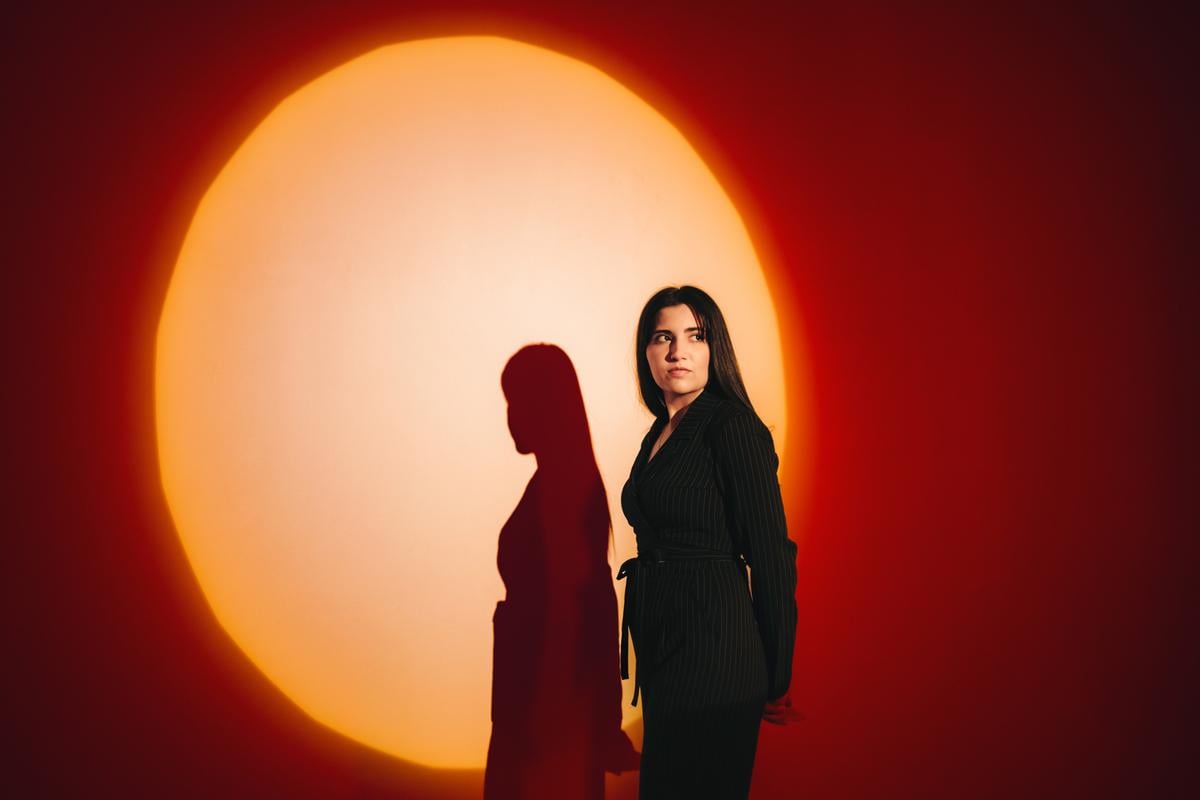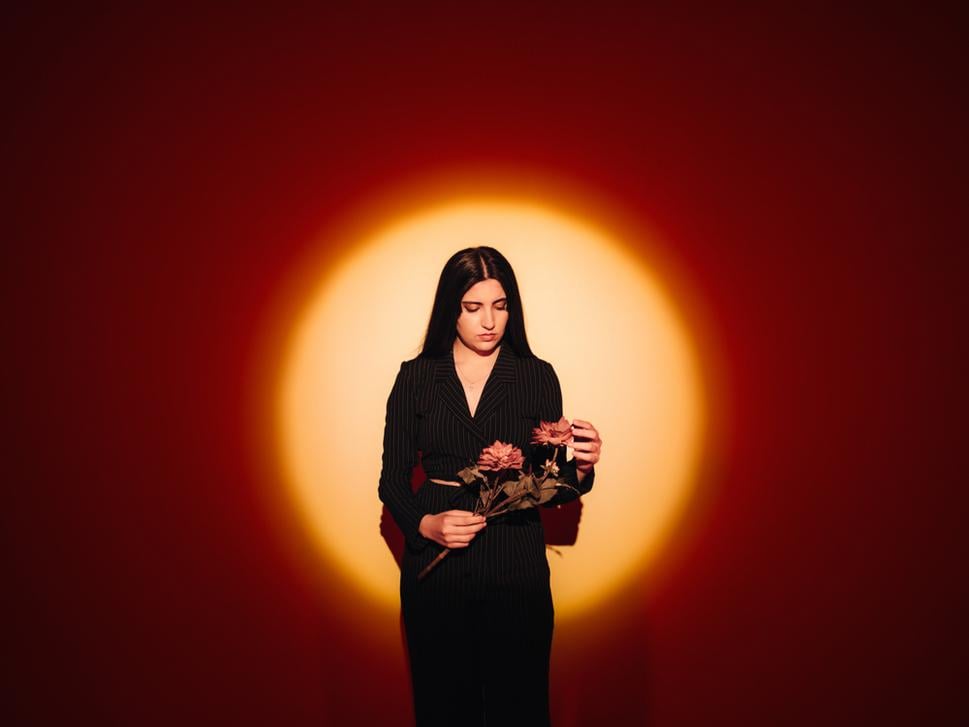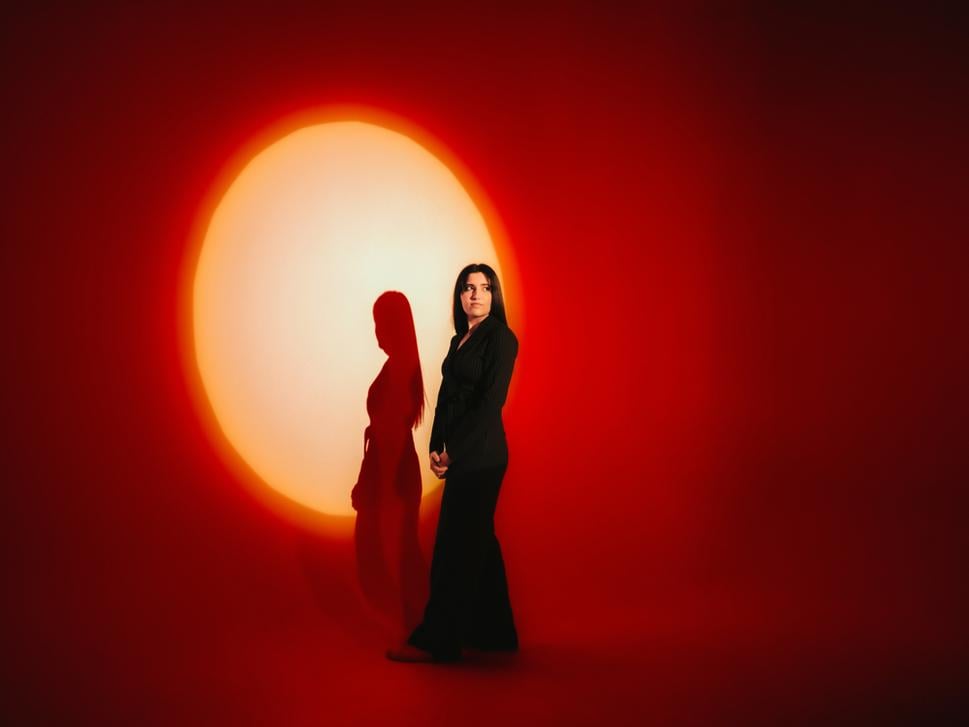The interview was originally published in the magazine fjúžn.
Mirna's roots trace to Iraq, where she lived until she was 15. Initially, her family resided in Baghdad, but were forced to move to Karakosh due to their Christian faith. In August 2014, they fled to a refugee camp in Erbil in the Kurdistan region to avoid ISIS. They never returned; along with other Assyrian Christians they headed to Slovakia.
For three months they were in the Humenné refugee camp, after which the Christians were relocated to villages in Nitra Region. Since then, Mirna has been living in Slovakia with her family and finished secondary school. She is currently studying information management in Bratislava and, at the same time, works and helps the Mareena civic association.
Her full name is Mirna Khaleel Majeed Ayshoa Yousif Kaka.

What was it like growing up in Iraq?
Since I am a girl, I had more restrictions compared to boys. For example, I wasn't allowed to ride a bike. In Iraq, cycling is considered a threat to virginity. A woman must be a virgin when she gets married. We weren’t allowed to swim either because swimsuits cover only a small part of the body. These activities aren't strictly prohibited, but people would gossip.
Do you miss Iraq?
I mostly miss my sister, who returned to Iraq from Slovakia. I also miss that everyone understood me. I am very talkative, and sometimes I say something in Slovak that can be understood differently, even though I don't mean it that way. Sometimes it leads to awkward situations, but I no longer feel embarrassed about it.
You speak five languages. Is it difficult for you to express yourself in Slovak?
Not really, I even think in Slovak now. It's automatic.
You came to Slovakia when you were 15. How do you feel about both countries? Which one do you consider your home?
Both countries are, and at the same time aren’t, my home. I was born in Iraq. My whole family and the traditions I try to keep come from there. I look like an Iraqi too. Now I live in Slovakia, where I have my family, friends, relationships, and I attend university. Each is my home in a different way. But home doesn't mean that I belong to one place.
Has this influenced your identity in any way?
Sometimes I feel lost. I don't know where I belong. At times it's challenging to follow all Iraqi and Slovak traditions. I try to combine them, but I feel bad that I don't fully belong to either.
Which traditions do you follow?
Fasting before Easter, for example, which is different from how Slovaks do it. It lasts 40 days, during which I don't eat anything before noon. In the afternoon, I only eat vegan food, like home-made falafel with the amba sauce (a traditional Iraqi mango sauce - Ed. note), fries, and salad. During the first and last week, I fast all day except for Sunday. From traditions in Slovakia I've adopted Christmas gifts. We don't have that in Iraq, and I like it a lot. One of my sisters started it, and now we all enjoy it.
Are there any traditions in Slovakia that seem strange to you?
The Easter tradition of pouring water on girls and women. It's unfair, men even get money or chocolate for doing it. I don't get it. In Iraq, everyone pours water on everybody around this time. It's sort of a public town-wide game. Buckets, bags, and balloons filled with water are prepared and you throw then at anyone; children, women, men, and seniors all take part. It's a lot of fun. Once, I even managed to soak wet our bus driver. He complained that the water was warm.
What does faith mean to you?
Since I come from a Muslim country, I almost always have to prove that I'm Christian. People don't believe me, they think I'm Muslim. Faith should be something between me and God. I shouldn't have to explain anything to anyone. Some things in religion don't make sense to me, so I don't observe them. But that doesn't mean I'm not a Christian.
What does being a Christian mean to you? How do you understand Christianity?
To be kind to people. If I know someone needs help, I help them. To bring hope and joy, to be a light in the darkness for others. That's what Christianity means to me.
You had to flee Iraq because your family is Christian.
I didn't understand why it was so important for a country to follow only one religion. I went to school with Muslims, my friends observed the Islam faith. To me, it was not a problem at all.
Is it true that ISIS marked Christian homes with a large letter N (N stood for Nazarene - Ed. note)?
Yes. We were targets. They did it so they would know which house they could burn down, destroy, or loot.
If you hadn't left Iraq, you would have had to convert to Islam, pay high taxes, or face death threats.
We learned what happened to people who stayed. They were subjected to the worst things imaginable. They were killed, women were raped. It was horrifying.
How did you get to Slovakia?
That's a long story. Because of our faith, we had to move from Baghdad to Karakosh. We then started receiving letters, saying that if we don't leave, they will harm someone in our family. Karakosh was mostly inhabited by Christians, there were few Muslims. One day, the bells started ringing in all nine churches. That meant only one thing—ISIS was approaching, and we had to leave. We left the town at around six in the evening. By nightfall, they had taken over the entire town, destroying and burning houses. They destroyed our home too. When I think about it, I didn't really understand what was happening at the time. It's only in hindsight that I realise how bad the situation was.
Where did you flee to?
With only essential items and papers, we went to a camp in Erbil, northern Iraq. We thought we would return in three days, just like last time. Some people didn't even have their papers. We were crammed into tents, sleeping on the ground. We often didn't get enough food, or there was very little left. There were so many of us. It must have been incredibly hard for our parents to see their children in such a situation. When we were offered the chance to go to Slovakia after more than a year in the camp, we didn't hesitate. It meant we wouldn't have to fear every day about what would happen tomorrow, or whether we would have somewhere to live, something to eat or drink. Somehow, we managed to get through, and we became the people we are today.
Along with you, 152 people from Iraq came to Slovakia. You were accommodated in a camp in Humenné, and then moved to villages in Nitra Region. How did the locals perceive you when you arrived?
At first, we lived in Výčapy-Opatovce. There was a priest who took care of everything, and the village welcomed everyone. Our family later moved to Nitra because, at the time, we didn't speak Slovak well, and it was easier to live there.
Do you have an Iraqi community you meet with?
We used to meet a few years ago. We would go to Sunday masses together. They were led by Slovak priests in Slovak, but we also prayed in Arabic and sang Arabic songs. We celebrated holidays together. NGOs like Mareena and Pokoj a Dobro (Calm and Good) held various social activities for us. Now we all live in different places. We haven't seen each other for a long time.
Do you encounter prejudice in Slovakia because of your background?
People automatically assume I'm Muslim, which means a terrorist. That's how someone from an Arab country is seen. When I was fasting before Easter, people thought I was observing Ramadan. And, of course, not to mention stereotypes that foreigners come to destroy your country, cause trouble, or take money from the state, which we never received to begin with. They don't know that we worked and learned the language, with help from various organisations.
Have you experienced outright hatred towards you or your family?
Not yet. But because we have darker skin, in shops we're often looked at with suspicion or stopped.
How do you perceive Slovak society's attitudes towards foreigners?
It depends on where refugees come from. If someone is from an Arab country, they are viewed more negatively. Of course, there's still a group of people who think all foreigners are bad.
Civic engagement is a big topic right now. Do you participate in any civic activities?
I volunteer at the Mareena civic association. When refugees from Syria were passing through Slovakia recently, I helped with interpreting. In the past, I visited schools and events where people could learn more about me. We had the chance to talk and change things, at least in this way. People often asked me what language is spoken in Iraq, what traditions are observed, if we can have four husbands, ride camels, have electricity or television. They were also curious about my faith, thinking I became Christian only after arriving in Slovakia. They want to know how I came here, what we're allowed and not allowed to do in Iraq, and ask about relationships.
How do you feel when they ask about relationships, and what do you tell them?
I now answer almost every question openly. When it comes to relationships, in Iraq, you shouldn't have one before marriage. Everything must be official.
What's your happiest memory from Slovakia?
Here, I saw snow for the first time in my life. It was at the camp in Humenné. We were all waiting by the windows, and when a lot of snow fell, we rushed outside. We played for hours without gloves, building snowmen. Our hands froze, and then we put them under warm water. It hurt so much.
© [fjúžn] magazine

 Mirna Khaleel Majeed Ayshoa Yousif Kaka. (source: Soňa Maletz Nosáľová)
Mirna Khaleel Majeed Ayshoa Yousif Kaka. (source: Soňa Maletz Nosáľová)
 Mirna Khaleel Majeed Ayshoa Yousif Kaka. (source: Soňa Maletz Nosáľová)
Mirna Khaleel Majeed Ayshoa Yousif Kaka. (source: Soňa Maletz Nosáľová)
 Mirna Khaleel Majeed Ayshoa Yousif Kaka. (source: Soňa Maletz Nosáľová)
Mirna Khaleel Majeed Ayshoa Yousif Kaka. (source: Soňa Maletz Nosáľová)